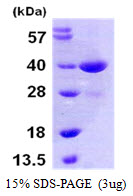order histories, retained contact details for faster checkout, review submissions, and special promotions.
Forgot password?
order histories, retained contact details for faster checkout, review submissions, and special promotions.
Locations
Orders Processing,
Shipping & Receiving,
Warehouse
2 Shaker Rd Suites
B001/B101
Shirley, MA 01464
Production Lab
Floor 6, Suite 620
20700 44th Avenue W
Lynnwood, WA 98036
Telephone Numbers
Tel: +1 (206) 374-1102
Fax: +1 (206) 577-4565
Contact Us
Additional Contact Details
order histories, retained contact details for faster checkout, review submissions, and special promotions.
Forgot password?
order histories, retained contact details for faster checkout, review submissions, and special promotions.
MAP2K3 / MEK3 / MKK3
mitogen-activated protein kinase kinase 3
MAP2K3 / MEK3 / MKK3 is a dual specificity protein kinase that belongs to the MAP kinase kinase family. This kinase is activated by mitogenic and environmental stress, and participates in the MAP kinase-mediated signaling cascade. It phosphorylates and thus activates MAPK14/p38-MAPK. This kinase can be activated by insulin, and is necessary for the expression of glucose transporter. Expression of RAS oncogene is found to result in the accumulation of the active form of this kinase, which thus leads to the constitutive activation of MAPK14, and confers oncogenic transformation of primary cells. The inhibition of this kinase is involved in the pathogenesis of Yersina pseudotuberculosis. Multiple alternatively spliced transcript variants that encode distinct isoforms have been reported for this gene.
| Gene Name: | mitogen-activated protein kinase kinase 3 |
| Family/Subfamily: | Protein Kinase , MAP2K |
| Synonyms: | MAP2K3, MAPKK 3, MAPKK3, PRKMK3, SAPK kinase 2, SAPKK-2, SAPKK2, SKK2, MAP kinase kinase 3, MEK 3, MEK3, MKK3, MAPK/ERK kinase 3 |
| Target Sequences: | NM_002756 NP_002747.2 P46734 |


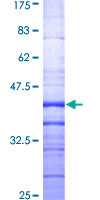
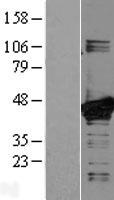

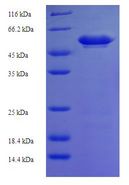
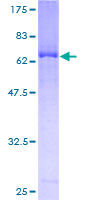

If you do not find the reagent or information you require, please contact Customer.Support@LSBio.com to inquire about additional products in development.

